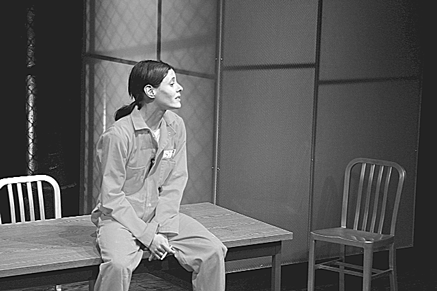Famous winners and infamous losers take their turns on stage
What is unspeakable about “Three Days of Rain” has very little to do with the play, the production, or even Julia Roberts’ performance. After it opened, I was truly shocked at the lengths people in the press, on chat boards, and in conversation went to heap vitriol on Roberts—so much that it made the national news.
Guess that’s star power today, and it’s a sad commentary on our culture that tearing apart honest work—regardless of one’s subjective sense of the quality—can consume the creative powers of so many in infantile bids for attention. It is Ayn Rand’s “The Fountainhead” come to life, in which a craven columnist uses his power with a credulous public to attempt to destroy the architect Howard Roark. This is Kurt Vonnegut’s “Harrison Bergeron,” which says that only mediocrity is acceptable as a norm so people don’t feel diminished by excellence.
It also smacks of sour grapes. Julia Roberts, who has been completely noble in response to this drubbing, has the unique ability to sell out the entire run of an obscure, straight play at full price in a heartbeat. She can make a lot of money for herself and others, and allow several thousand people the chance to see her live on stage. Roberts could not have been unaware of the challenges and the publicity risks or the penchant for schadenfreude among the critical community, but she did it anyway. Moreover, she got the whole country talking about Broadway, and that’s the business of the show that only Nathan Lane and Matthew Broderick can do—and not as well. She took the risk and that alone is an inspiration.
As for what’s on the stage, the play is not a triumph of American theater, to my mind. It is about the hard times of rich people coping with the luxuries that wealth provides, even to the mentally unbalanced, the advantages of stardom, and the struggle to realize creative vision. Nothing we haven’t seen before—or more recently much better in “Six Feet Under.”
At the same time, while the plot seems forced as we discover the source of all neurosis in act two—the actors play three young people in act one and their parents in act two—playwright Richard Greenberg has written six character studies that are intriguing enough on their own. Joe Mantello makes the characters work even if the play seems false, and Santo Loquasto’s set is appropriately rain drenched and gloomy.
Paul Rudd is wonderful in two distinct performances, and Bradley Cooper brings an inherent charm to his two roles, which are versions of the same person. Roberts turns in a very credible performance. What works is how present and focused she is throughout. In the first act, in which she plays a suburban housewife, seeking her runaway, disturbed brother, she is helpless and concerned and fed up all under a veneer of propriety. At one point, she simply pulls on the belt of her trench coat as if to try to hold herself together. There are many of these small moments, but they feel true and natural. Her second act character is showier, which requires less detailed work, but Roberts’ movie star charm carries her through it gracefully.
After watching “Guardians,” you may never look at the media the same way again—not that that is altogether a bad thing. A little more healthy skepticism and we might not be in Iraq. Using his fictionalized accounts of the Abu Ghraib/Lynndie England scandals and the publishing of fake torture pictures in London’s “Daily Mirror,” playwright Peter Morris has crafted a powerful play structured as twin monologues that lay bare one of the most corrosive values of our culture—advancement at any cost.
Subtly building the characters of the English Boy and the American Girl, who represent the ambitious journalist who created and sold the fake pictures and Lynndie England, Morris indicts the kind of cultural amorality that leads to these two events. In an eerie, but potent, subtext, Morris also explores the thin line that separates consensual S&M and torture, the corruption of the spirit that leads to this behavior, and the social construct that focuses only on ends and doesn’t really want to know about the means, until such time as the corruption is exposed and a whole new wave of scandals comes to light.
As the play unfolds we see how both characters justify their acts and that they are, in fact, sociopaths. There is also the implicit indictment of a culture so addicted to the adrenaline rush of outrage that facts become irrelevant and that lives are literally disposable, their only value as fodder for the machine. Rational thought? Forget it. Give us the dirt. It’s enough to make your skin crawl.
Lee Pace gives a terrific performance as the English Boy, his craven ambition, oozing from every pore, and his ability to shift his identity to serve his goals. He is slick, polished and totally creepy in a performance of rare commitment and variety. Katherine Moennig as the American Girl is not quite so well developed. Jason Moore seems to have directed her to hit one note, and the character is not so rich.
Even at 90 minutes, the play at times seems long, and the final 15 minutes feels redundant and unnecessary. Still, it is an important and thoughtful work that’s definitely worth a look.
gaycitynews.com



































